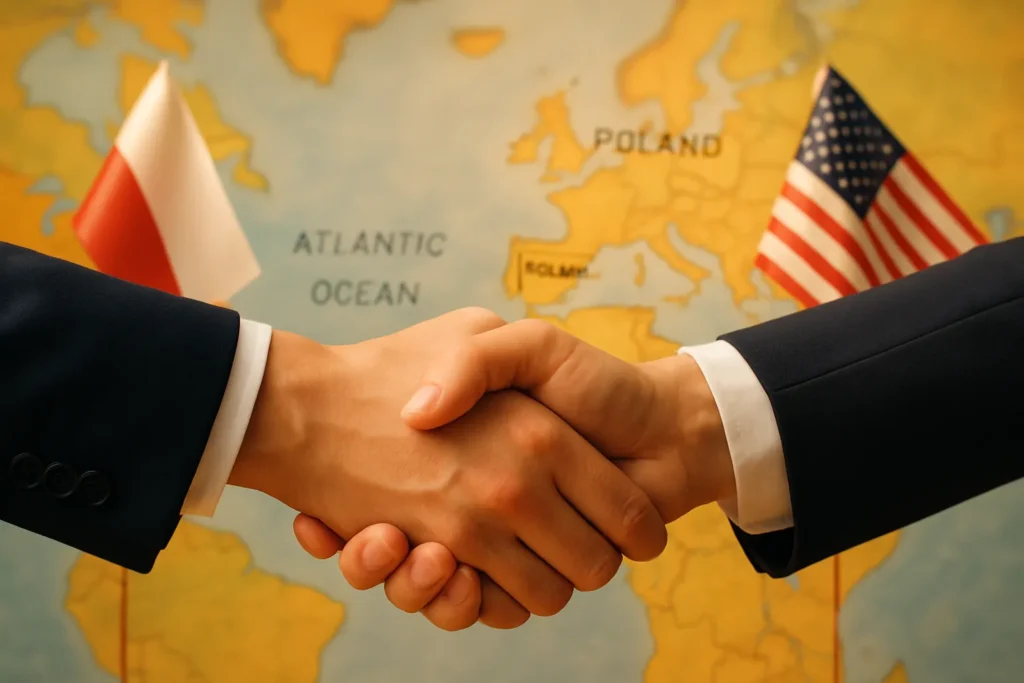The New Face of Polish Power: Nawrocki’s Right-Turn Debut
As Warsaw’s bells tolled in celebration on August 6, 2025, Karol Nawrocki took the oath as the new President of Poland—a ceremony marked not just by the stately traditions of state but by the sharp undercurrents of Europe’s resurgent right. For Nawrocki, this moment was more than symbolic: the very same day, an envelope bearing a White House seal arrived, inviting him for a September summit with President Donald Trump. Both men—ideological kin—are poised to recalibrate the fragile axis of U.S.-Polish relations.
Nawrocki’s election was anything but a landslide. In a runoff that echoed the fractious politics splitting Polish society, he eked out victory over centrist rival Rafał Trzaskowski, drawing only 31.36% of the votes in the first round.
The invitation’s timing was no coincidence. During the bruising campaign, Nawrocki eagerly sought Trump’s blessing. The now-famous May photo—Trump and Nawrocki flashing thumbs-up in the Oval Office—became both a political endorsement and a dog whistle to Poland’s nationalist base. Observers in Warsaw argue that this transatlantic nod helped tip the electoral scales. As Warsaw University political scientist Katarzyna Sobolewska notes, “No moment was as effective for Nawrocki as that White House snapshot. It gave him outsider credibility while reassuring his core supporters of U.S. backing.”
A Conservative Alliance: Foreign Policy or Domestic Echo Chamber?
Staging his first overseas trip in Washington—true to campaign promises—Nawrocki sends a clear signal about his priorities: cementing ties not just with the U.S., but specifically with Donald Trump. Nawrocki touts his status as an ‘independent,’ but few in Poland doubt his alignment. He is a close ally of the nationalist Law and Justice party (PiS), known for orchestrating sweeping judiciary curbs and a clampdown on independent media that drew condemnation from the EU.
This upcoming September 3 White House meeting will undoubtedly focus on “strengthening bilateral ties, bolstering security cooperation, and reaffirming NATO commitments.” Yet underneath the diplomatic script lies a complex dynamic. In recent years, PiS-aligned leaders have leveraged American support as a shield against Brussels’ scrutiny—particularly over Poland’s erosion of democratic norms. Now, with two right-wing leaders at the table, critics worry that shared ideology will eclipse shared values.
What’s at stake? American defense dollars flow steadily into Poland, and U.S. troops help anchor NATO’s eastern flank. Poland’s government, long wary of Russian ambitions, finds an eager partner in Trump’s transactional vision of alliances. At first glance, the arrangement looks pragmatic; but a closer look reveals risky consequences if democracy and rule of law take a back seat. According to the European Council on Foreign Relations, “Continued U.S. support may embolden Polish hardliners to further distance themselves from European democratic standards.”
The echoes are hard to miss: Trump’s previous term featured public praise for Poland’s ‘tradition’ and ‘sovereignty,’ a rhetorical cover that excused illiberal policies. You have to ask—will this be a new, constructive chapter in global security, or just a transatlantic echo chamber for nationalist talking points?
“In pivoting to Trump, Nawrocki gambles not just with Poland’s foreign policy, but with the fabric of liberal democracy in Central Europe.”
Navigating the Risks: NATO, Values, and the Road Ahead
Bilateral ties with Washington bring tangible wins. American investment and military cooperation—vital bulwarks for Poland against Russian aggression—rarely face challenge across the political spectrum in Warsaw. NATO’s Article 5 rests on trust, not tweets. But what should not be overlooked is the peril of prioritizing short-term security guarantees over enduring democratic principles.
History is rich with lessons of alliances made for the wrong reasons. Seventy years ago, U.S. support fortified Franco’s Spain, providing stability but at the cost of democratic delay. Are we seeing a modern replay? The Polish electorate is deeply divided, and Nawrocki, despite his outsider claims, ascended with help from the same political machinery that has cracked down on judges, teachers, and protestors. According to a 2024 Pew Research Center survey, trust in Polish democratic institutions is at a decade low—especially among young urban voters shed by Nawrocki’s brand of nationalist populism.
Donald Tusk, Poland’s pro-European Prime Minister and Nawrocki’s main domestic adversary, has warned against what he calls ‘over-personalized diplomacy.’ “Alliances must serve the people, not just the presidents,” Tusk argues, raising a critical point about the danger of reducing complex, multi-stakeholder partnerships to photo-ops and handshakes.
Beyond that, the context is shifting: autocracy is on the march across Europe, and American messaging matters. If Trump uses his platform to excuse Polish illiberalism, copycats across the continent could see new license for democratic rollbacks. Harvard historian Anne Applebaum cautions, “Support for ‘sovereignty’ at the expense of the rule of law only encourages more Orbans, more Kaczyńskis, more rollback of freedom.”
Still, there is space for optimism. Pro-European parties lead city governments in Warsaw, Gdansk, and Krakow; tens of thousands have marched to defend judicial independence; U.S.-based NGOs continue to fund civil society in Poland. True partnership, built on mutual respect for democracy as well as defense, is still possible—if leaders are willing to look beyond personal power plays.

